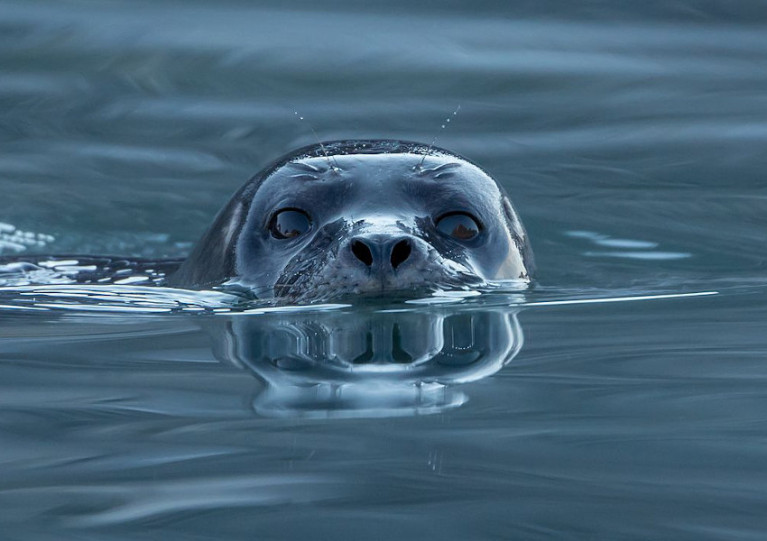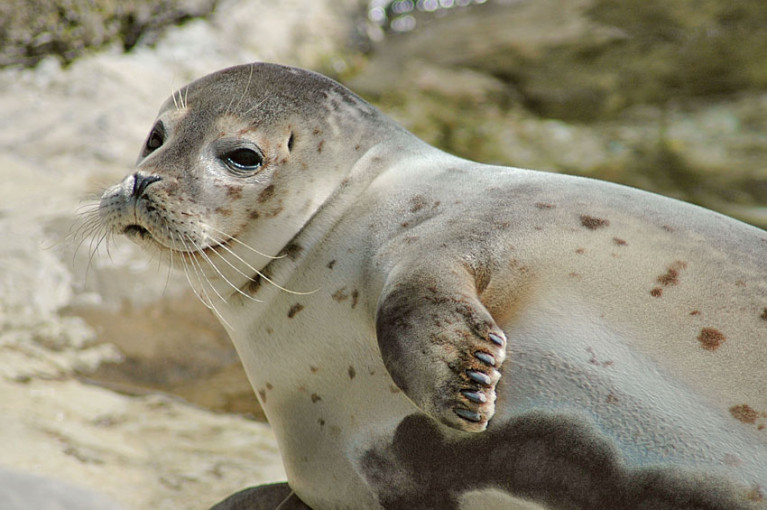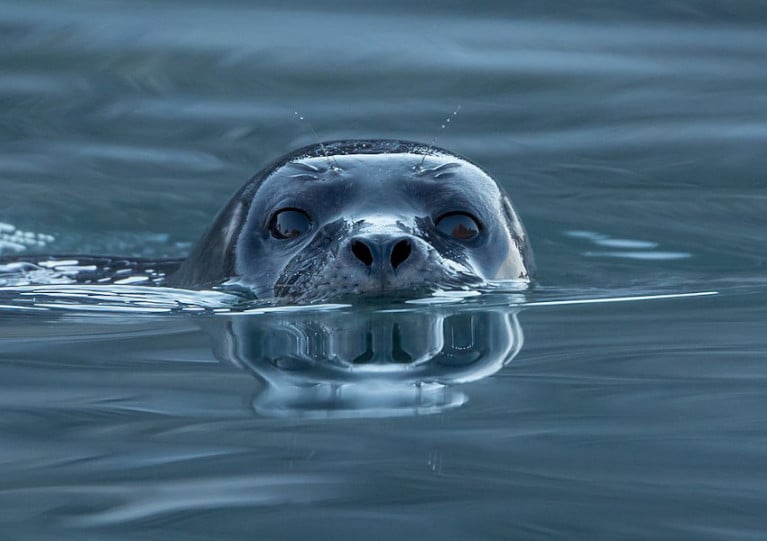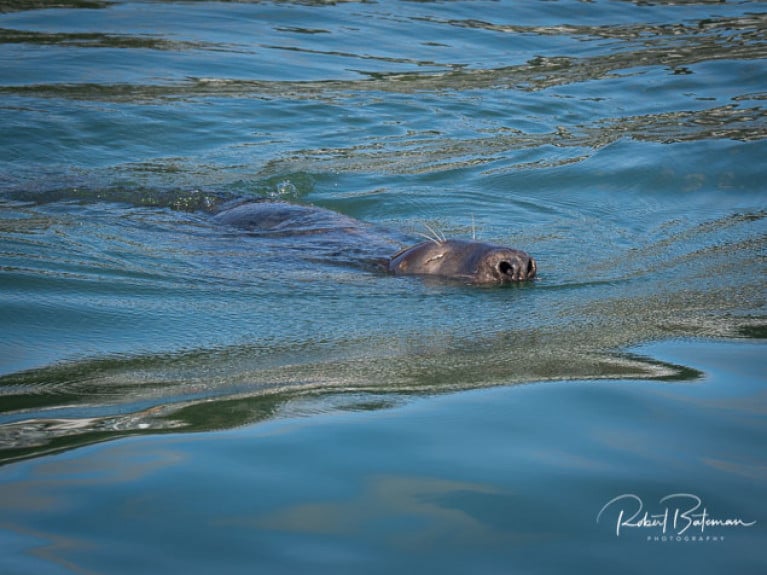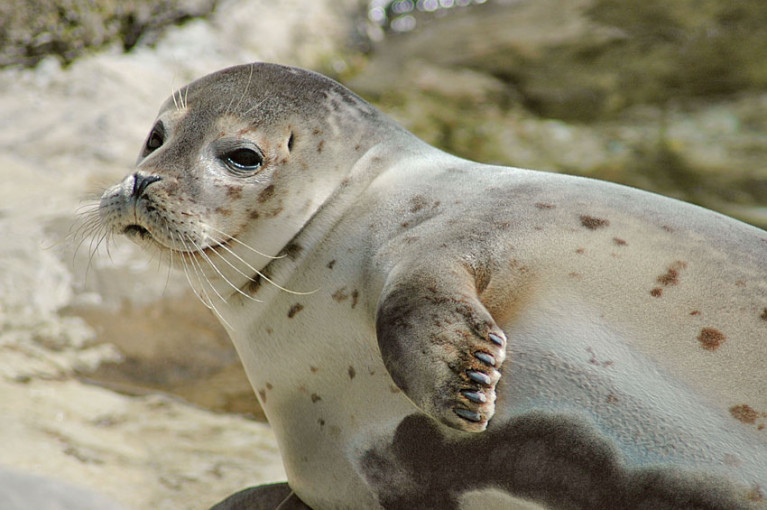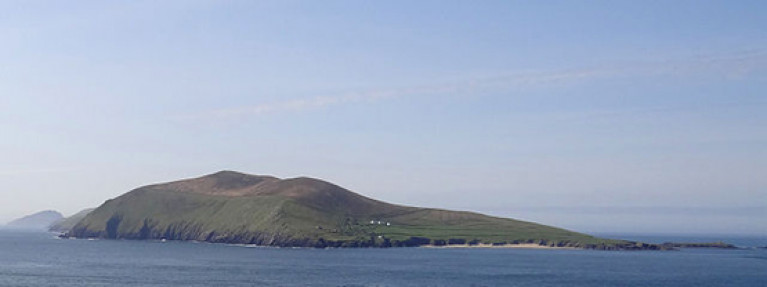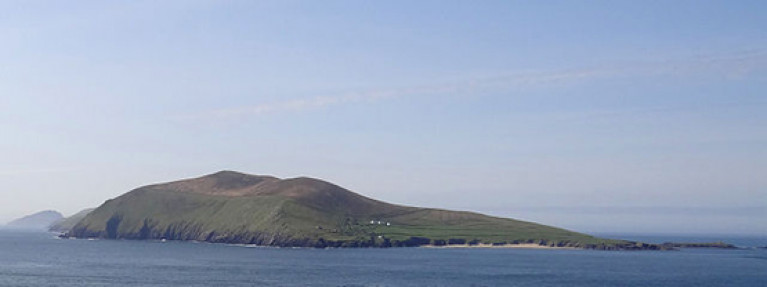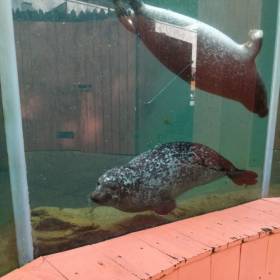Displaying items by tag: seals
First Irish Case of Grey Seal Preying on Harbour Porpoise Is Confirmed
The first case of a grey seal predation on a harbour porpoise in Irish waters has been confirmed, the Irish Whale and Dolphin Group (IWDG) says.
Video of the incident off Clogherhead in Co Louth on Sunday 14 November was submitted to the marine wildlife charity. It appears to show an adult grey seal with a porpoise calf in its mouth and attempting to drown its victim before feeding on it.
Sightings officer Pádraig Whooley said there was “little doubt” as to what was occurring in the footage, which can be seen below. Some viewers may find the video disturbing:
Andy Smith, who was fishing on the pier in Clogherhead when he shot the video, said: “We initially saw the mother and baby about 200m out to sea but about 20 minutes later the seal surfaced with the baby porpoise in its mouth.
“It was quite violent and bloody. Thankfully there were no kids around to witness it. Nature raw in tooth and claw I suppose.”
Whooley added that the incident, while rare, is not without precedent. A paper published in the journal Marine Mammal Science in 2014 offered the first evidence of grey seal predation on harbour porpoise in the English Channel and North Sea.
“However, this behaviour has never before been documented in Irish waters, which is surprising given the large populations we have of both coastal species,” he said.
The incident now opens questions as to whether this is indeed new behaviour from an Irish seal “or one that has simply never before been witnessed or recorded in Ireland”.
In addition, it is not confirmed whether the seal in the video is from an Irish resident population or one that travelled here from the North Sea area.
Whooley also posits: “What are the likely implications at population level for the resident harbour porpoises of Clogherhead and beyond? Especially given that areas like north Co Dublin have some of the highest densities of porpoises in Irish waters.”
Watersport Poses ‘Real Risk’ to Strangford Lough’s Marine Wildlife, Says National Trust
Marine wildlife in Strangford Lough faces a “real risk” from an increase in recreational watersport, as The Irish News reports.
Rangers from the National Trust in Northern Ireland recorded a record number of grey seal pups and a “stable” population of Brent geese in their latest annual survey of the Co Down inlet.
But despite this good news, the Designated Special Area of Conservation could be put under pressure by a marked increase in paddle boarding and kayaking — particularly close to seal pupping areas and bird nesting sites.
Lead ranger Hugh Thurgate says: “There’s work to do to educate outdoor activity leaders about wildlife disturbance, to ensure they are aware of the risks and understand what areas of the lough to avoid during breeding season.”
The Irish News has more on the story HERE.
Wildlife Service Probes Suspicions of Foul Play in Headless Seals Incident
The National Parks and Wildlife Service (NPWS) has confirmed it is investigating the recent discovery of beheaded seals on a Co Kerry beach.
But as TheJournal.ie reports, the situation may not be as sinister as might appear at first glance — with experts saying it’s not unusual for seal carcasses to wash ashore headless by various causes.
The most recent concern was prompted by a report from a woman walking on Banna beach in Co Kerry, where she described happening upon mutilated seal carcasses on the sand.
However, Melanie Croce of Seal Rescue Ireland in Courtown, Co Wexford says that while it does appear the seals in question were beheaded, “this is actually something that we’ve seen for many years and many other rescues see it as well worldwide.
“Unless you’re doing a post-mortem examination, it’s very difficult to determine the cause of death. But, you know, we can’t prove anything either way,” she added.
Seals have become a divisive issue in the South West in recent years.
Earlier this month the Government shot down proposals to allow the culling of seals by rifle in the vicinity of protected areas where local inshore fishermen claim their catch is being depleted by the appetites of seal colonies.
TheJournal.ie has much more on the story HERE.
Decapitated Seals Disturbing Sight for Locals On Co Kerry Beach
Local residents have been disturbed by the discovery of decapitated seals on a Co Kerry beach, as the Irish Examiner reports.
Speaking to Kerry Today on Radio Kerry, a local woman described coming upon the grisly scene on Banna beach where a number of seal carcasses lay mutilated.
And she suggested that the heads had been purposefully removed in incidents that were not the result of an animal attack.
The revelation will recall memories of similar seal beheadings in Dingle in the summer of 2012, for which the culprits were never found.
The Irish Examiner has more on the story HERE.
Seal Cull Plan is a Non-Starter for Government Ministers
Today’s Sunday Independent reports that Government ministers have shot down proposals for a seal cull by rifle from boats off Cork and Kerry.
Internal emails show that Minister of State Malcolm Noonan rejected the suggestion as being “politically unacceptable”.
And both he and Housing Minister Darragh O’Brien shared the view that a compensation scheme for fishermen who say seal predation on fish stocks has harmed their livelihoods “would be a better approach”.
As previously reported on Afloat.ie, inshore fishermen in Kerry have argued that the depletion of fishery stocks and damage to nets in and around the Blasket Islands is “unsustainable”.
But suggestions that fishermen be given the green light to cull seals from their vessels with high-powered rifles were branded as “insane” by a conservation expert.
The Sunday Independent has more on the story HERE.
Trying to Get to the Truth About Shooting Seals
One of the most difficult, controversial and upsetting marine environment stories I have reported in my time as a marine correspondent concerns seals. I've seen them rehabilitated by a sanctuary and marvelled at the work put into healing injured, sick seals and releasing them back into the sea. I've seen fishermen provide fish to feed those seals being rehabilitated.
I've also heard fishermen claim, in anger and fury, that their catches were taken from their nets, partially eaten and then discarded useless by seals.
I've seen injured seals and heard allegations by animal welfare groups and environmentalists that fishermen had taken the law into their own hands against protected species.
Under the Wildlife Acts 1976 to 2018, cetaceans and seals are protected species.
 Seals are a protected species Photo: Bob Bateman
Seals are a protected species Photo: Bob Bateman
Dáil debate
In recent weeks the whole issue has come to the fore again, after a Dáil debate when national media reported that licences could be given to fishermen for a cull to shoot seals. There was another outburst of fury, particularly on social media. But what is the truth of this issue?
Inland Fisheries Ireland
Official records show that the State agency responsible for the conservation, protection and management of Ireland's inland fisheries and sea angling applied three times for licences to shoot seals. A spokesperson for Inland Fisheries Ireland confirmed that it had applied for Section 42 authorisations from the National Parks and Wildlife Service on three occasions in the last 10 years. No application has been made this year. "One seal has been removed under a Section 42 authorisation in the last 10 years for reasons of public safety," the IFI said.
National Inshore Fishermen's Association
The National Inshore Fishermen's Association said there had been "biased reporting by mainstream media" which never interviewed anyone from the inshore fisheries sector. "If you take the time to listen and consider fishermen's complaints, you'll understand there are two separate aspects. The first is the amount of fish seals eat and the impact it has on fish stocks. The second is the economic impact seals have on fishers' livelihoods."
So, for this week's podcast, I spoke to the Secretary of the Inshore Fishermen's Association, Alex Crowley.
Listen to the Podcast here
Plans For Fishermen’s Seal Cull By Rifle Branded ‘Insane’
Plans to allow for the culling of seals by fishermen with high-powered rifles have been branded as “insane” by a conservation expert.
According to the Irish Examiner, the Government is looking into the granting of licences that would permit fishermen to shoot seals in order to protect their catches.
The move follows claims by local fishermen in Kerry that seal colonies in the Blasket Islands — a Special Area of Conservation — and elsewhere are largely responsible for depleted fish stocks and damage to nets, a situation which they say is “unsustainable”, as previously reported on Afloat.ie.
While a licence for the Blaskets was refused, one of four others this year has been approved, and the rest — across Kerry and Cork — are being considered by Local Government Minister Darragh O’Brien.
“There are concerns about this approach to seal management, given the potential safety concerns arising from using high-powered rifles on moving platforms,” the minister said in a written response to Kerry TD Micael Healy-Rae.
"Nonetheless, my department is examining the potential for a pilot scheme which would test this approach and determine its efficacy in protecting fishermen’s catches.”
However, Irish Wildlife Trust’s Pádraic Fogarty said the idea of “shooting seals with rifles from boats is insane”, and suggested that chronic overfishing and bottom trawling have had a greater impact on available catches.
His comments echoed those of the Irish Seal Sanctuary earlier this year. Its co-founder Brendan Price told RTÉ that culling seals by gun is “essentially wasting a bullet, it’s futile”.
The Irish Examiner has much more on the story HERE.
‘Cull Not The Answer’ Says Seal Sanctuary As Fishermen Renew Call
The Irish Seal Sanctuary has said a seal cull is not the answer to the woes of Dingle Peninsula fishermen, who claim a booming population of the protected marine wildlife is putting their livelihood at risk.
Sanctuary co-founder Brendan Price told RTÉ News that “you’re essentially wasting a bullet, it’s futile” as “an apex predator such as a seal is controlled by the available food source”.
Late last year, inshore fishermen who work around the Blaskets, which is a Special Area of Conservation, blamed the local seal colonies for depleted fish stocks and damage to their nets, arguing the situation was “unsustainable”.
Now the fishermen say they are “at breaking point”, with one claiming that seals actively follow their boats to target their catch.
RTÉ News has more on the story HERE.
Kerry Fishermen In Call For Seal Cull Over ‘Unsustainable’ Stock Depletion
Depleted fish stocks and damage to nets in and around the Blaskets are “unsustainable”, argue local fishermen who have called for a cull of the area’s seal population, as the Irish Examiner reports.
The inshore fishermen allege that colonies of grey and common seals in the Blaskets — both protected marine wildlife species in the EU and within a Special Area of Conservation — are responsible for depleted pollock stocks, among others, which it is said is forcing smaller fishermen out of the industry over winter or even permanently.
Fisherman Adam Flannery told a public meeting in Dingle before Christmas: “We are looking for a cull. Because if we do not get a cull in six to eight months, within a few years there won’t be any inshore boat in Dingle.”
The Irish Examiner has more on the story HERE.
Tracking Of Juvenile Seals Is A First For Northern Ireland
Two juvenile seals named Ariel and Merida after the Disney princesses are part of a novel marine research project using the latest technology to record and understand harbour seals’ behaviour.
In a first for Northern Ireland, the Exploris Aquarium in Portaferry, Co Down has teamed up with University College Cork as part of the EU-funded, Loughs Agency-led SeaMonitor project to tag the female rehabilitated seals prior to their release from Knockinelder Beach in Co Down yesterday (Sunday 17 November).
Although seal pups have been rehabilitated and released by Exploris since 1989, this is the first time they have been tracked following release to give scientists a better understanding of how they fair post-release.
‘Although seal pups have been rehabilitated by Exploris since 1989, this is the first time they have been tracked following release’
Dr Mark Jessop, lead scientist from UCC, said: “We use state-of-the-art tags glued to the seals’ fur which drop off naturally during the seal’s annual moult, but until then provide information on where the seals are going as well as their dive behaviour.
“This gives us unique insights into post-rehabilitation survival and how juvenile seals learn to forage successfully in the wild.”
It is hoped that the data will be used to inform better management and protection for harbour seals.
The release of the two seals marks the first this season from Exploris Aquarium, NI’s only seal rehabilitation facility — with more releases to come.
“On average we take in about two dozen seals every year,” said Exploris curator, Peter Williams. “Seals are a protected species here in the UK and Europe so at Exploris we take in seal pups from all over the Northern Irish coast that have succumb to illness or have been affected by human interference and as a result abandoned by their mothers.”
Loughs Agency chief executive Sharon McMahon added: “This is an especially exciting time as the seals are the first species to be monitored since the project launched earlier this year.
“The agency is proud to be leading the way alongside expert colleagues from statutory and academic institutions and a range of stakeholders that will ultimately produce dynamic management plans for some of our most important and vulnerable species.”
‘These achievements ensure the safeguarding of our shared marine environment’
Discussing the importance of this work, Gina McIntyre, CEO of the Special EU Programmes Body, said: “I’m delighted to hear about the progress of this pioneering EU INTERREG cross-border project, which has seen a tremendous amount of development in such a short space of time.
“These achievements ensure the safeguarding of our shared marine environment and continue the necessary conservation work to protect priority species and habitats just like Ariel and Merida.
“The significant progress so far can be attributed to the strong cross-border partnership, combined with innovative marine technology. The expertise and determination of SeaMonitor’s project partners is helping push the boundaries of marine research in the seas not only around Northern Ireland, but in Ireland and Western Scotland.”
The work is part of SeaMonitor — a unique marine research project, the first of its kind in Europe, studying the seas around Ireland, Western Scotland and Northern Ireland.
The project is led by the Loughs Agency and supported by another eight leading marine research institutions, using innovative marine species tracking technology to better understand and protect vulnerable marine life in our oceans.



























